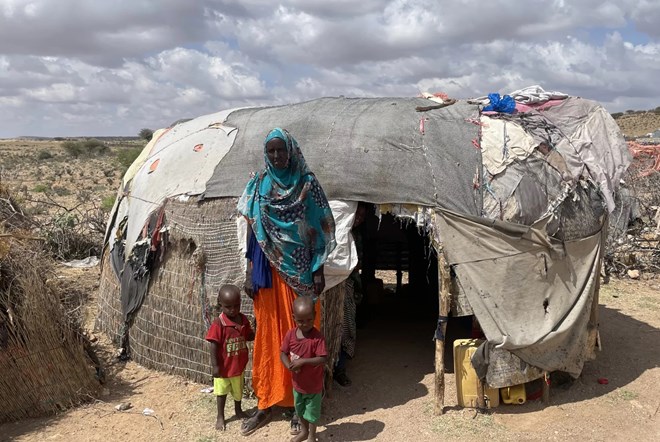
Jamal Abdi Sarman
Monday March 4, 2024

UNICEF Somalia/Sarman
Sahra Ahmed Abokor, a mother of six, migrated from Eeel Ade village more than a hundred kilometres from the township of Garadag. Abokor’s situation typifies that of tens of thousands of families living in the vast, arid regions of Togdheer, Sool and Sanag who were displaced by the severe drought that afflicted eastern parts of Somaliland in 2022 and part of 2023.
“The drought wiped out our entire herd of goats that numbered close to 200. With my children and husband, we were forced to leave our village to save our lives. We walked for days and ended up here where we settled as internally displaced persons.”
advertisements
The local authorities say that the drought was the harshest in decades. It dried up water pans and boreholes and decimated pastures, forcing families from far-flung villages like Eeel Ade to flee to areas like Garadag in search of assistance.The assistance provided to these families included direct cash transfers of about US$60 per month. The Humanitarian Cash Transfer programme ran from June to December 2023, initiated by UNICEF with funding from the German Development Bank KFW, supported families with pregnant women and children under 5 years of age.
Some 14,000 people were assisted through the programme, giving them cash to buy basic commodities like food, cooking oil and water while building their ability to ride out future climate shocks.
“Before the cash transfers started, we had nothing, and the host community also had nothing more to share with us,” says Abokor. “As a family, we couldn’t afford even a single meal a day. My children became malnourished. We were at our limit. Luckily, we were assessed and enrolled in the programme, which has had an immediate impact on our lives. We were able to buy critical commodities like food and cooking oil, which uplifted our situation.”
UNICEF worked with partners like the Health Education Agro-Pastoralist Liaison, a local non-profit organization, to implement the programme. Telesom, a leading mobile network provider in Somaliland, transferred the cash directly to eligible recipients’ mobile phones, given that 95 per cent of the targeted households already had mobile money accounts with the company.
As most people in Somaliland do not possess formal identification documents, the programme adopted voice recognition technology to verify the recipients. Eligible households were identified using an open registration system at Maternal and Child Health Centers and validated by local authorities and community members.
The use of mobile money allowed the recipients to retain the cash in their mobile wallets and make purchases, at their choosing, from local shops and vendors or to withdraw the cash from Telesom vendors or cash points.
Iftin Hamud Hassan was among the programme’s beneficiaries in the IDP camp, home to more than 400 households. The mother of seven was displaced by drought from the wider Sanag region.
“We lost everything. We settled here, completely destitute. When I was enrolled in the cash transfer programme, I brimmed with hope. With the money, we were able to buy food and other needs from the local market. Our lives were saved by this programme.”
Another notable benefit of the programme, says Samsam Yusuf, head nurse at the Garadag Maternal and Child Health Center, was the improved nutritional status of mothers and children participating in the programme.
“We noticed through screening that children from displaced families were the most affected by malnutrition, including Abokor’s twin children. The cash the family was receiving enabled them to buy food which aided the children’s full recovery. During their treatment, the family also had access to outpatient therapeutic services, counselling, and immunization.”
The cash transfer programme has had a multiplier effect beyond the families by injecting much-needed cash into the local economy, which had been depressed by the drought.
“At the start of each month, there was a noticeable buzz of commercial activity in the township, especially the women who commuted to the markets and shops to buy essential supplies,” adds Samsam.
As the six-month cash transfer programme was a short-term humanitarian intervention, it ended in December 2023. There is no denying, however, that without it, many children like Abokor’s would have lost their lives.